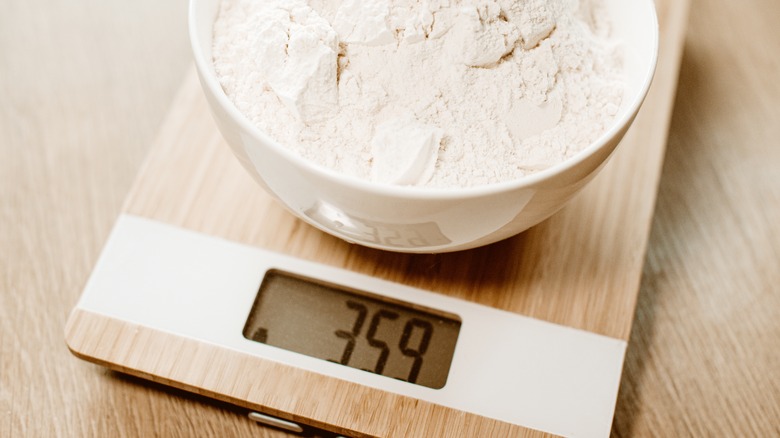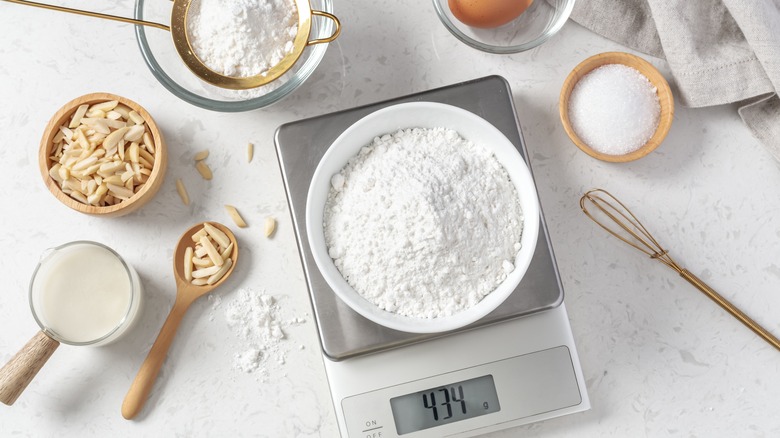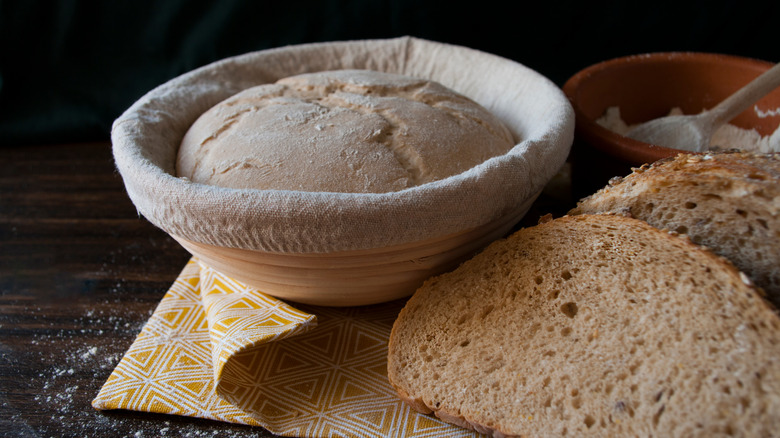For Perfect Homemade Sourdough, Consider Using 2 Scales
Sourdough bread has something of a cult following. Although there have always been devoted fans of its unique, tangy flavor, the bread shot to stardom mid-pandemic when everyone was shut inside in desperate need of a way to keep busy. Suddenly and unexpectedly, the yeast-less sourdough came to save the day with its simple, fermentation-based leavening. It didn't need yeast to rise to greatness, and so it became the hobby of the moment. That hasn't died down, though. There are still home bakers everywhere who kept their sourdough starters fed or who are just getting into the practice and yielding the delicious results.
Despite the simplicity of its flour-and-water levain, though, sourdough can be tricky, and it takes a little practice to dish out the perfect loaf. Sometimes, the bread just falls flat. If you're still looking for secrets to get your sourdough just right, it might be time to invest in two different kitchen scales. You'll want a precise digital kitchen scale that will weigh your ingredients in one-gram increments — it's perfect for larger quantity ingredients in the recipe, like flour. However, a lot of the ingredients in sourdough come in very small quantities (think salt and sugar), and these kitchen scales can become inaccurate trying to read the tiny weights. That's why your second scale needs to be one designed for minuscule measurements, like those accurate in 0.01g increments.
The importance of weight when it comes to baking
A lot of cooking comes down to art; it's about taste and preference for flavor or texture. Baking, though, involves formulas and precise chemical reactions to make the recipes behave correctly — cookies and cakes need the right texture, bread needs to rise. Experience is important and experimentation is possible, but more often than not, precision is key. Measuring ingredients in measuring cups and spoons is just not as precise as measuring by weight.
Even if your measuring cups are accurate themselves (which isn't always the case), there's a lot of human error involved in using these kinds of tools. If you're packing an ingredient tightly or tamping the top to make it even, you'll get a far different measurement than if the ingredient is scooped lightly or piled on top. Flour is especially variable. Scooping out of the bag with the cup, spooning into the cup, and sifting the flour all lead to different amounts — even if the measured flour technically fits into a cup.
Weighing ingredients on a scale removes these variables. The number of grams that the recipe calls for will always be that number — you won't have to rely on your eyes or a guess. Using the wrong amount of flour, sugar, or any other ingredient will greatly affect the texture and quality of your final bake. If you're looking for the perfect loaf, even ingredients with small amounts need the precision of an accurate scale.
Other useful tools to ease the sourdough process
Scales for large and small measurements are important for ensuring the best bake every time, but if you're stocking up for your sourdough sideline, there are other essential baking tools that you can rely on for success. When you're growing your starter, you'll want to rely on the rubber band tip for sourdough — for which you only need, well, a rubber band. Just wrap the band around your sourdough starter's container for a quick visual guide to how much the starter has grown.
Not all the sourdough tools are easily found languishing in your junk drawer, but they're worth the few extra procurement steps. Sourdoughs are temperature sensitive, so getting an accurate thermometer lets you keep track of the temperature of all the individual ingredients as well as your dough once it comes together. A bench knife, also sometimes called a bench or dough scraper, will be useful for more than just sourdough baking — you'll be able to easily cut dough, crusts, and everything in between into even portions (and scrape up mess afterwards). Once you reach the proofing point of your baking process, a banneton will improve your homemade bread. These proofing baskets help the dough to maintain its shape and structure while it rises, and they also provide some humidity control. Just a few simple tools will lead to consistent sourdough deliciousness.


